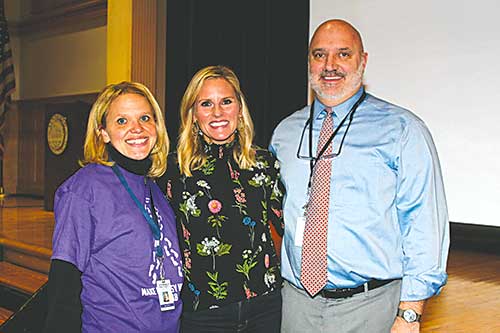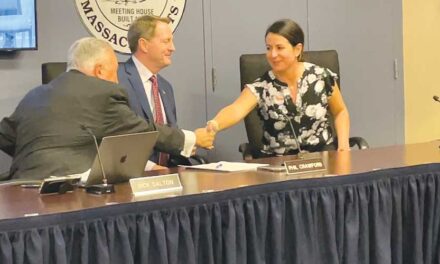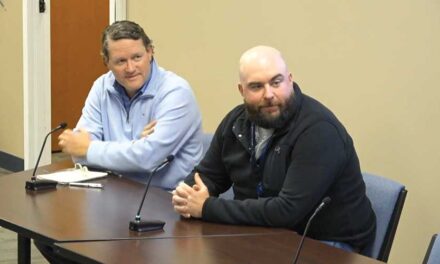Published March 20, 2019
By DAN TOMASELLO
LYNNFIELD — People suffering from anxiety and depression are not alone, NBC Sports Boston reporter Trenni Kusnierek told Lynnfield Middle School seventh and eighth graders on March 15.
The middle school invited Kusnierek to give the presentation as part of Wellness Week. LMS wellness teacher Sheri Weeks noted the Middle School PTO funded Kusnierek’s presentation as well as other Wellness Week activities.
Kusnierek started dealing with anxiety when she was 5 years old, which is when she was “constantly worrying about things.” Her anxiety often caused her to become violently ill, which she said her family thought was the side effect of being homesick.
“When I was growing up, we didn’t have a name for anxiety or depression,” said Kusnierek. “I didn’t talk to anyone about it. When I was in sixth grade, my anxiety started to turn into something a little bit darker. My parents moved us from Milwaukee to the suburbs. I missed my old friends and I just didn’t feel like I was fitting in at school. I was sad all the time and I didn’t want to leave home.”
Kusnierek said her anxiety and depression started getting worse as she progressed into high school and college.
“I thought this is who I am,” said Kusnierek. “Sometimes I am a really, really happy person and sometimes I am a really, really sad person.”

NBC SPORTS BOSTON REPORTER Trenni Kusnierek (center) was welcomed to LMS on March 15 by wellness teacher Sheri Weeks and Principal Stephen Ralston. Kusnierek shared her struggles with anxiety and depression with seventh and eighth graders. (Dan Tomasello Photo)
Kusnierek had to relocate from her family and friends after she got her first television job. She became so depressed that she locked herself in her apartment for two days.
“I just kept crying and I didn’t know why,” said Kusnierek. “I was living the dream that I always wanted, but I was so sad.”
Kusnierek decided to search the internet in order to identify the cause of her sadness. That is when she started suspecting that she suffered from depression.
“I thought how could I have depression?” said Kusnierek. “I am a perfectly healthy 22-year-old kid who just graduated from college, have a really cool job and am living my dream. That can’t be possible. But it kept persisting.”
Kusnierek decided to ask her former pediatrician about her symptoms while taking her brother to an appointment. She said the doctor told her she was depressed.
“In a weird way, his matter-of-fact nature made me feel so much better because I finally knew what was wrong,” said Kusnierek. “And he said we can fix this.”
After returning home, Kusnierek started talking to a therapist and taking medication.
“I was no longer holeing myself up in my room and not leaving my apartment,” said Kusnierek. “But I still wasn’t telling anybody about it because it felt weird. It wasn’t something people could see. And on the outside, it seemed like I had it totally together.”
While covering a Milwaukee Brewers game in May 2012, Kusnierek read a tweet that announced former NFL linebacker Junior Seau had committed suicide.
“Everybody thought Junior was the greatest guy in the whole world,” said Kusnierek. “He had everything going for him. But this happy go-lucky guy who made millions of dollars playing football was so sad and so alone that he thought the best option was to end his life.”
Kusnierek said Seau’s tragic passing inspired her to tell a “Milwaukee Magazine” journalist her story. After the story was published, she said family, friends and athletes reached out to show their support. Someone of the people who reached out to her said they were dealing with the same issues.
The journalist has since become a mental health advocate, and wrote a story last week about Red Sox second baseman Brock Holt and Red Sox pitcher Brian Johnson’s “battles with anxiety and depression.”
“You would never know that about either of them, especially Brock,” said Kusnierek. “When Brock walks into a room, the whole place lights up. But guys like them and Demi Lovato, Kevin Love and Michael Phelps talking about depression is so great because it’s proof that when you look at somebody, you don’t really know what is going on in the inside.”
Kusnierek said social media can often fuel anxiety and depression.
“While social media is a great way to communicate, it’s also a place that makes a lot of people feel sad about ourselves or it’s an outlet to make other people feel bad about themselves,” said Kusnierek.
Even though Kusnierek’s struggles with anxiety and depression have been incredibly difficult, she is glad she went through it because the illnesses inspired her to become a better person. She recalled that she was “a mean girl” in middle school.
“I felt so bad on the inside that I took it out on other people,” said Kusnierek. “Looking back now, I am so ashamed of how I acted. But I am really happy I have gone through this because it made me understand people better and has helped me be kinder and more emphatic to other people.”
Kusnierek encouraged the students battling anxiety and depression to discuss it with a trusted adult.
“If you tell somebody, then they can help you,” said Kusnierek. “And if you start to get help, you start to feel better. And if you start to feel better, then maybe you will feel better talking about what you are going through and maybe you can help another friend. Think of it as a game of dominoes. Because it really is important for us to realize that lots of people are going through this.”
Q&A
After Kusnierek concluded her presentation, she answered questions from students. Some students submitted questions in a note that were placed in a box in order to conceal their identity.
A student asked if Kusnierek still takes anxiety medication.
Kusnierek said she took anxiety medication for a long time and started weaning herself off it last year. She said she would start taking medication again if she needs it, and admitted she took some the night before the presentation because she was anxious about it.
A student wrote in a note that they suffer from anxiety and depression, and that their parents won’t let them talk about it.
Kusnierek encouraged the student to speak to a teacher about the situation in order to see if they can “come up with ways to talk to your mom or dad about it.”
A student inquired if anyone ever mocked Kusnierek for suffering from anxiety and depression.
“Not anyone that I care about,” said Kusnierek. “My friends and family have been unbelievably supportive. Sometimes people will say really mean things to me on Twitter or Instagram. You know what I do? I block them because they don’t matter.”
Another student inquired in a note what should they do if they feel sad and lonely.
Kusnierek encouraged the student to “spend time with people,” particularly friends and loved ones. She said they could help the student feel better and help them find ways to address the situation.
After Kusnierek concluded the Q&A, she was given a round of applause.




